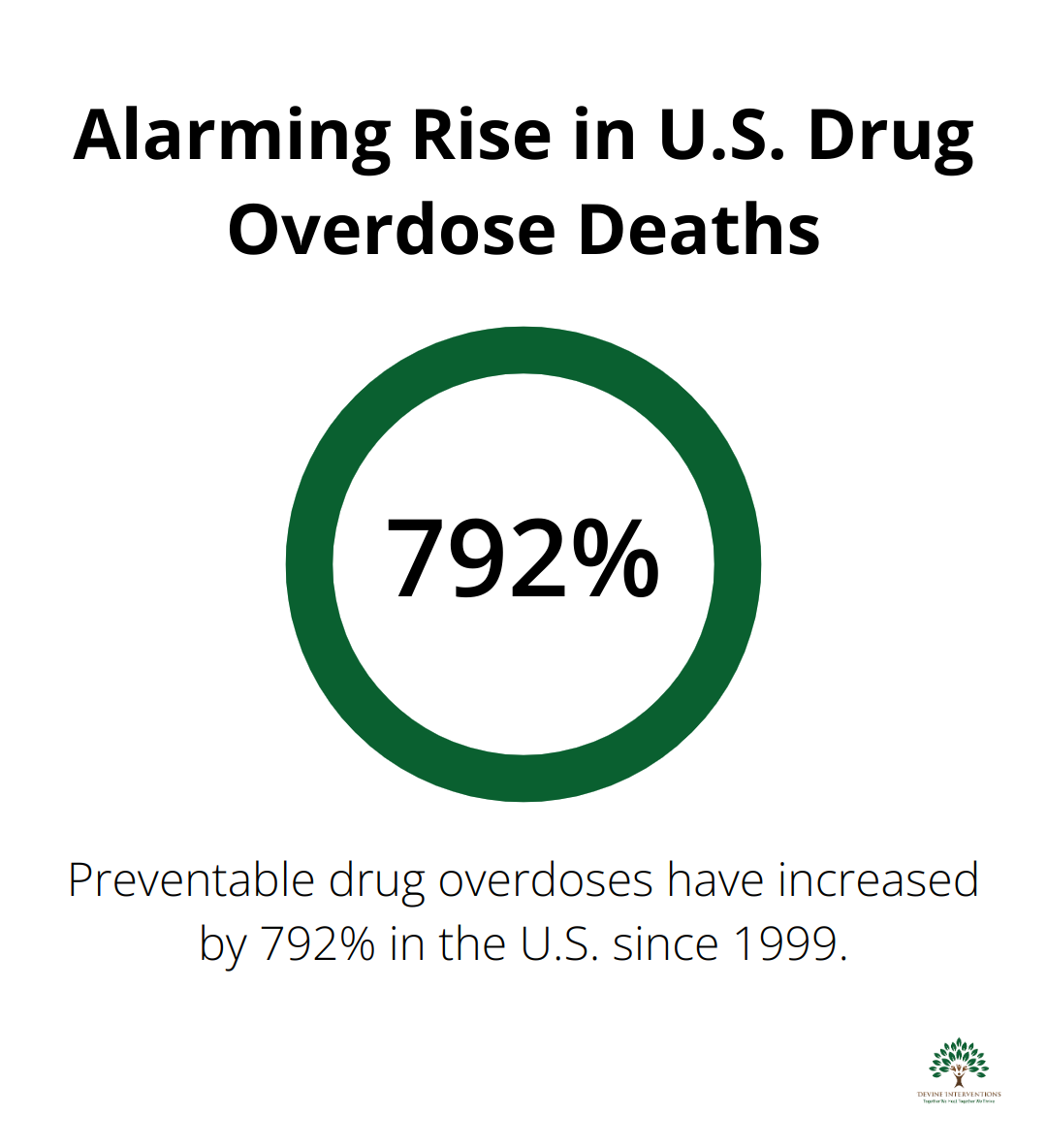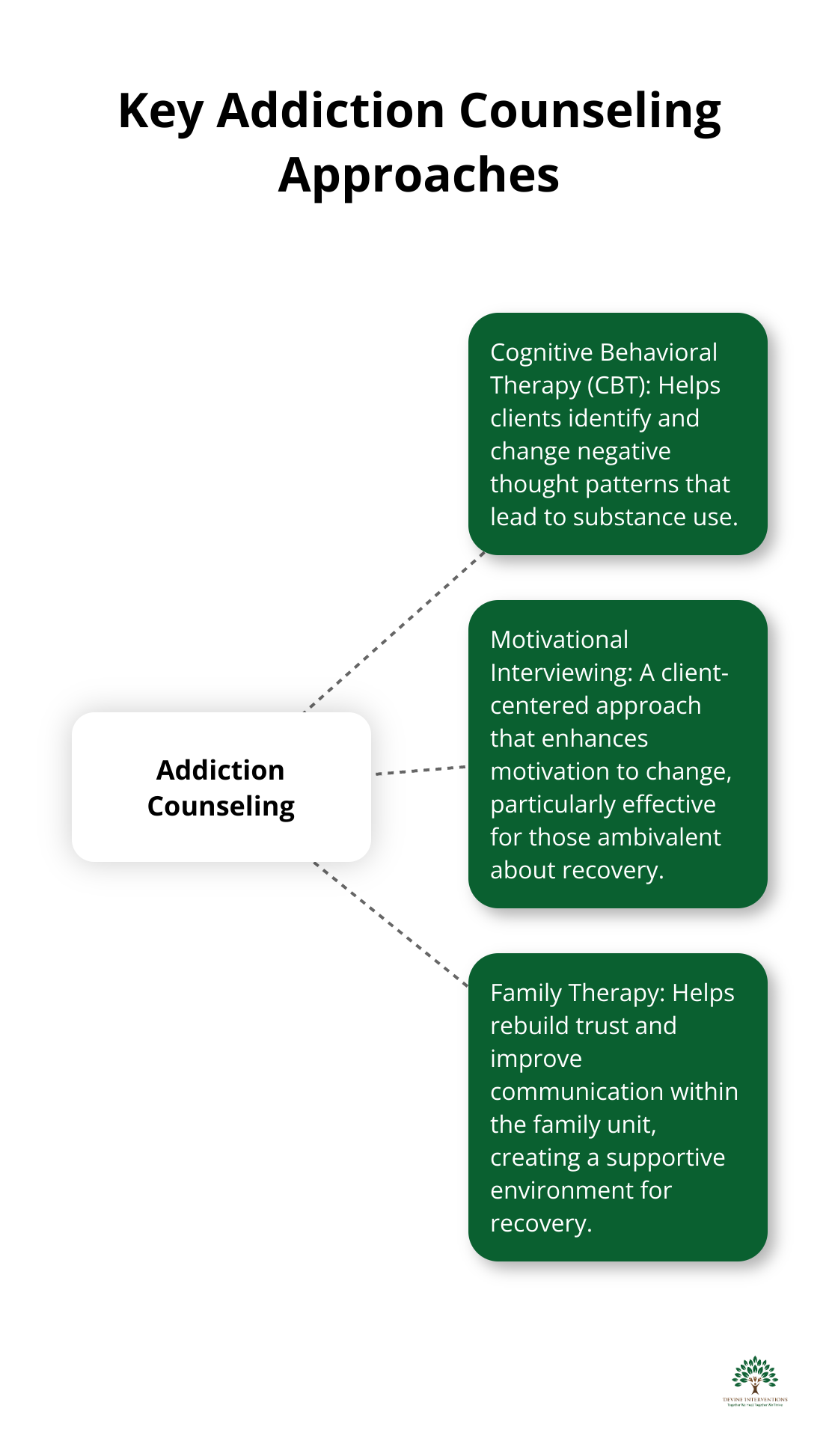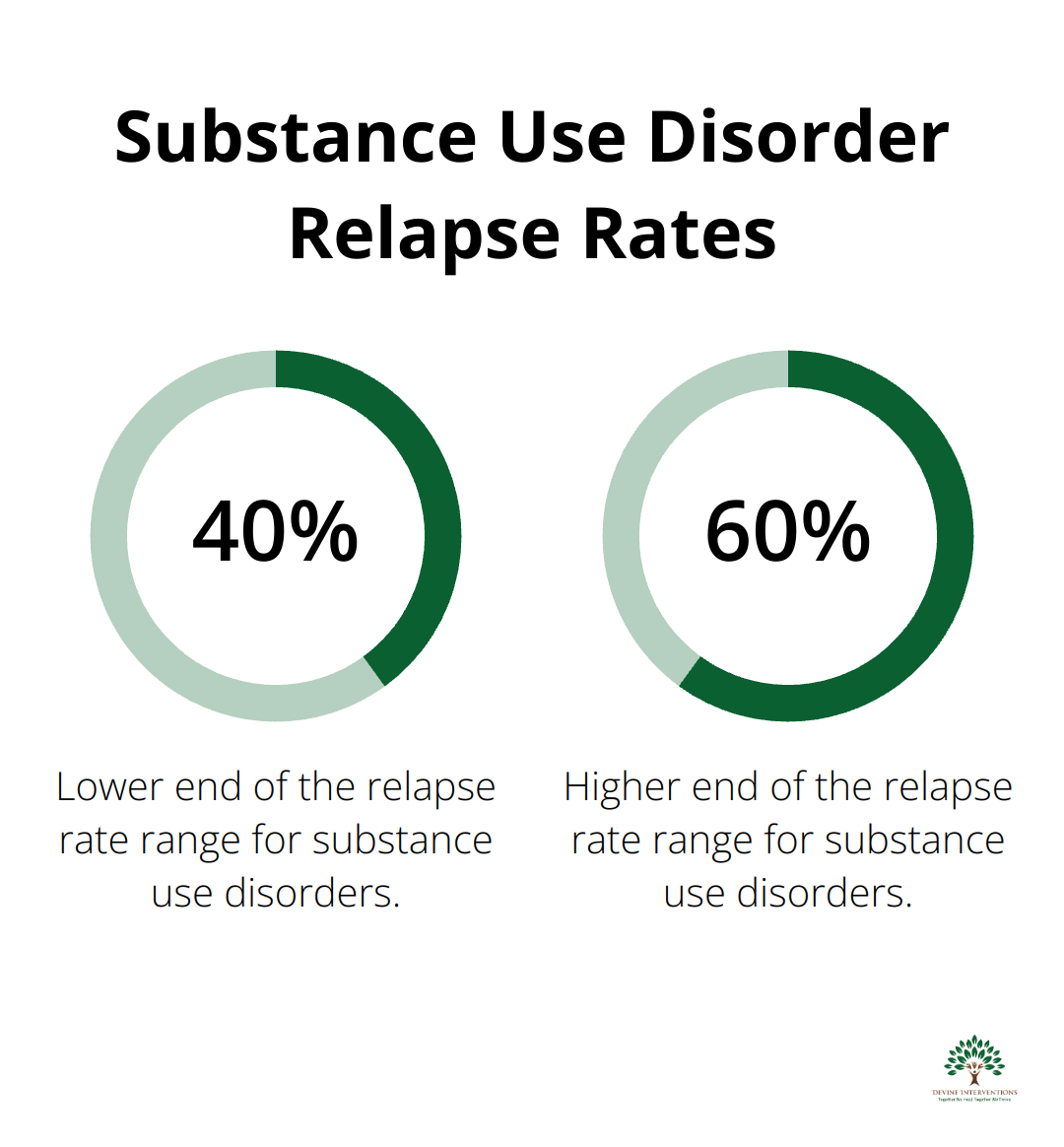Addiction can feel like an overwhelming force, but there’s hope for recovery. At Devine Interventions, we’ve seen firsthand how addiction counseling can be a game-changer in the healing process.
This powerful tool equips individuals with the skills and support needed to break free from addiction’s grip. In this post, we’ll explore why addiction counseling is a crucial step towards reclaiming control and building a healthier future.
What Is Addiction and How Does It Impact Lives?
Addiction is a complex brain disorder that affects millions of Americans. It’s characterized by compulsive drug use or behaviors despite harmful consequences. Addiction rewires the brain’s reward system, making it difficult for individuals to resist cravings.
The Physical Toll of Addiction
Substance use disorders take a heavy toll on the body. Long-term alcohol use can lead to liver damage, while opioid addiction increases the risk of overdose. According to the National Institute on Drug Abuse, preventable drug overdoses have increased an alarming 792% in the United States since 1999. This stark statistic underscores the urgent need for effective treatment.

Psychological Consequences
Addiction doesn’t just affect physical health. It profoundly impacts mental well-being. Many individuals struggle with co-occurring disorders like depression or anxiety. These conditions often feed into the cycle of addiction, making recovery more challenging.
Relationships and Daily Life
The ripple effects of addiction extend far beyond the individual. Families bear the brunt of broken trust and financial strain. Work performance suffers, leading to job loss in many cases. Family involvement in a person’s recovery from addiction has significant benefits for both the addicted patient and other members of the family.
Addiction can isolate individuals from their support systems. That’s why effective treatment approaches emphasize rebuilding these crucial connections.
The Path to Recovery
Understanding addiction’s far-reaching impact is the first step toward healing. If you or a loved one struggles with addiction, know that help is available. Professional support can address not just the addiction itself, but its wide-ranging effects on your life.
Treatment options (such as those offered by Devine Interventions) can provide the tools and support needed to break free from addiction’s grip. These programs often include individual counseling, group therapy, and medication management when appropriate.
As we explore the role of addiction counseling in recovery, it’s important to recognize that seeking help is a sign of strength, not weakness. Let’s examine how professional guidance can be a game-changer in the healing process.
How Addiction Counseling Transforms Lives
Addiction counseling stands as a powerful tool that reshapes lives. Professional guidance provides a structured environment for healing, uncovering the root causes of addiction.
The Impact of Professional Support
Experienced therapists work one-on-one with clients to reveal underlying issues like trauma or mental health conditions that fuel substance use. This underscores the critical role of professional support in recovery.
Tailored Approaches for Lasting Change
There’s no universal solution in addiction treatment. A range of counseling approaches addresses individual needs:
Cognitive Behavioral Therapy (CBT): This method helps clients identify and change negative thought patterns that lead to substance use. Empirical studies consistently support CBT as an effective treatment option for drug addiction.
Motivational Interviewing: This client-centered approach enhances motivation to change. It proves particularly effective for those ambivalent about recovery.
Family Therapy: Addiction affects the entire family unit. Family therapy sessions help rebuild trust and improve communication, creating a supportive environment for recovery.

Building Skills for Long-Term Success
Effective counseling extends beyond addressing the addiction itself. It equips clients with practical life skills:
Stress Management: Learning healthy ways to cope with stress is essential. Techniques like mindfulness and deep breathing exercises prove invaluable.
Communication Skills: Many clients struggle with expressing needs and emotions. Improved communication can reduce the likelihood of turning to substances.
Relapse Prevention: Identifying triggers and developing solid strategies to avoid relapse significantly improves long-term outcomes.
The Power of Personalized Care
Every individual’s journey through addiction is unique. Personalized care (tailored to specific needs and circumstances) increases the chances of successful recovery. This approach takes into account factors such as:
- Personal history and trauma
- Co-occurring mental health conditions
- Family dynamics and support systems
- Cultural background and beliefs
The journey to recovery presents challenges, but professional counseling provides the support, tools, and guidance needed to reclaim life from addiction. As we explore the key components of effective addiction counseling in the next section, you’ll gain a deeper understanding of how these elements work together to create lasting change.
What Makes Addiction Counseling Effective?
Effective addiction counseling transforms lives. Let’s explore the key elements that make counseling work.
Personalized Coping Strategies
Addiction recovery requires tailored approaches. Effective counseling helps clients develop individualized coping strategies. These may include:
- Mindfulness techniques to manage cravings
- Stress-reduction exercises for specific triggers
- Practical problem-solving skills for daily challenges
According to the National Institute on Drug Abuse, relapse rates for substance use disorders range from 40% to 60%, highlighting the importance of personalized treatment plans in long-term recovery.

Trauma-Informed Care
Many individuals with addiction have experienced trauma. Addressing these underlying issues is essential for healing. Trauma-informed care:
- Creates a safe environment to explore painful experiences
- Uses specific techniques (like EMDR) to process traumatic memories
- Helps clients understand the link between past trauma and current substance use
Recent research estimates the overall treatment completion rate at 59%, with experimental studies reporting higher rates of completion than observational studies.
Strong Support Networks
Recovery thrives with support. Effective counseling helps clients build and maintain robust support networks. This includes:
- Identifying supportive family members and friends
- Connecting with peer support groups (such as AA or NA)
- Learning to communicate needs and boundaries effectively
A study in the Journal of Substance Abuse Treatment found that individuals with strong support networks are twice as likely to maintain long-term sobriety.
Evidence-Based Practices
Successful addiction counseling relies on proven methods. These evidence-based practices include:
- Cognitive Behavioral Therapy (CBT): Helps clients identify and change negative thought patterns
- Motivational Interviewing: Enhances motivation to change
- Dialectical Behavior Therapy (DBT): Teaches skills to manage emotions and improve relationships
Holistic Approach
Effective counseling addresses the whole person, not just the addiction. This comprehensive approach considers:
- Physical health and wellness
- Mental health concerns
- Spiritual or existential questions
- Social and environmental factors
Addiction counseling isn’t just about stopping substance use. It’s about building a new life. If you’re ready to take the first step towards recovery, don’t wait. Reach out to a professional counselor today.
Final Thoughts
Addiction counseling empowers individuals to reclaim control over their lives. It addresses the root causes of addiction and equips people with essential skills for long-term recovery. Through personalized strategies, trauma-informed care, and evidence-based practices, counseling helps build a new, healthier future.
Professional support can make a significant difference for those struggling with addiction. Devine Interventions offers a comprehensive approach that combines clinical expertise with genuine compassion. Our range of services (including intensive outpatient programs and ongoing therapy) meets individuals where they are and guides them towards a brighter future.
Recovery is possible with the right support and guidance. You have the strength to overcome addiction and build the life you deserve. Take the first step towards healing today by reaching out to a professional counselor.







